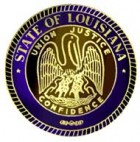 Louisiana Supreme Court
Louisiana Supreme Court
The Louisiana Supreme Court issued one lawyer discipline order in August:
- William F. Henderson. The Court disbarred the respondent (by consent) for a criminal felony conviction stemming from his conversion of client funds.
Louisiana Attorney Disciplinary Board
The Louisiana Disciplinary Board issued the following recommendations and rulings in August:
- George A. Blair, III. The Board ordered that some of the charges against the respondent be dismissed, and that the respondent be publicly reprimanded for other misconduct. As to the dismissed charges, the Board concluded that even though the respondent was disciplined in federal court, ODC did not establish by clear and convincing evidence that he violated the Louisiana rules. As to the conduct leading to the public reprimand, the respondent negligently failed to cooperate with ODC.
- James H. Carter, Jr. The Board recommended that the respondent be suspended for six months, all deferred, subject to two years probation and Ethics School for negligently practicing law (to assist a friend) while he was inactive or ineligible.
- Leslie R. Leavoy, Jr. The Board recommended that the responded be suspended for two years, fully deferred and that he be required to enter into a five-year LAP agreement. He failed to move a client’s case along with diligence, and lied to the client about its status. He suffered from alcoholism, but was in recovery.
- Debra L. Cassibry. The Board recommended that the respondent be suspended from the practice of law for one year and one day. She had multiple DWI offenses, and evidence of unresolved substance abuse issues, including failure to cooperate with ODC and LAP.
- Lashanda Marie Robinson. The Board recommended that the respondent be suspended from the practice of law for three years. She knowingly converted approximately $22,000 in funds owed to third-party medical providers and mismanaged her trust account. Although the baseline sanction was disbarment, the Board recommended suspension because of the existence of significant mitigating factors, including inexperience, lack of prior discipline, health problems, good character and cooperation during the investigation.
- Richard L. Fewell, Jr. The Board found that ODC failed to carry its burden of proof and dismissed the formal charges against the respondent. ODC had alleged an oral lawyer fee-sharing arrangement in violation of Rule 1.5(e). The hearing committee and board found, however, that “there is no specific language in the Rule’s provision as to when the agreement or advisement of shared representation and legal fee must be reduced to writing. Obviously, it is prudent for such writings to occur at the commencement of the representation. However, in this instance, the clients clearly understood that both attorneys were involved in handling their case and expected them to be compensated accordingly. The fact that this was not written into Respondent’s Contingency Fee Agreement and was only memorialized in the Funds Disbursement Form is a technicality . . . .”
Louisiana Attorney Disciplinary Board Hearing Committees
Various hearing committees of the Louisiana Disciplinary Board issued the following reports and recommendations in August:
- Robert A. Liptak. Hearing Committee No. 39 recommended that Mr. Liptak be denied reinstatement to the practice of law after a year-and-a-day suspension. Despite filing the petition for reinstatement, Mr. Liptak testified that he was not “physically capable” of practicing law. He testified that he did not comply with his LAP contract. He admitted to taking mood altering substances. The real question: why did he file a petition for reinstatement in the first place? Odd indeed.
- C. Hearn Taylor. Hearing Committee No. 11 recommended, in a deemed-admitted default proceeding, that the respondent be suspended from the practice of law for a period of one year, with all but sixty days deferred. The respondent took a fee for handling a post-conviction matter, and did no work, failed to communicate with the client and refused to return the unearned fee.
- Clarence T. Nalls, Jr. Hearing Committee No. 1 recommended that the respondent be suspended from the practice of law for three years. The committee found that he continued to practice law even after being suspended and took fees from clients during that time. He also failed to maintain proper trust account records, failed to provide a client with a copy of the client’s file, and failed to provide a proper accounting of funds to the client.
Please follow and like us:
